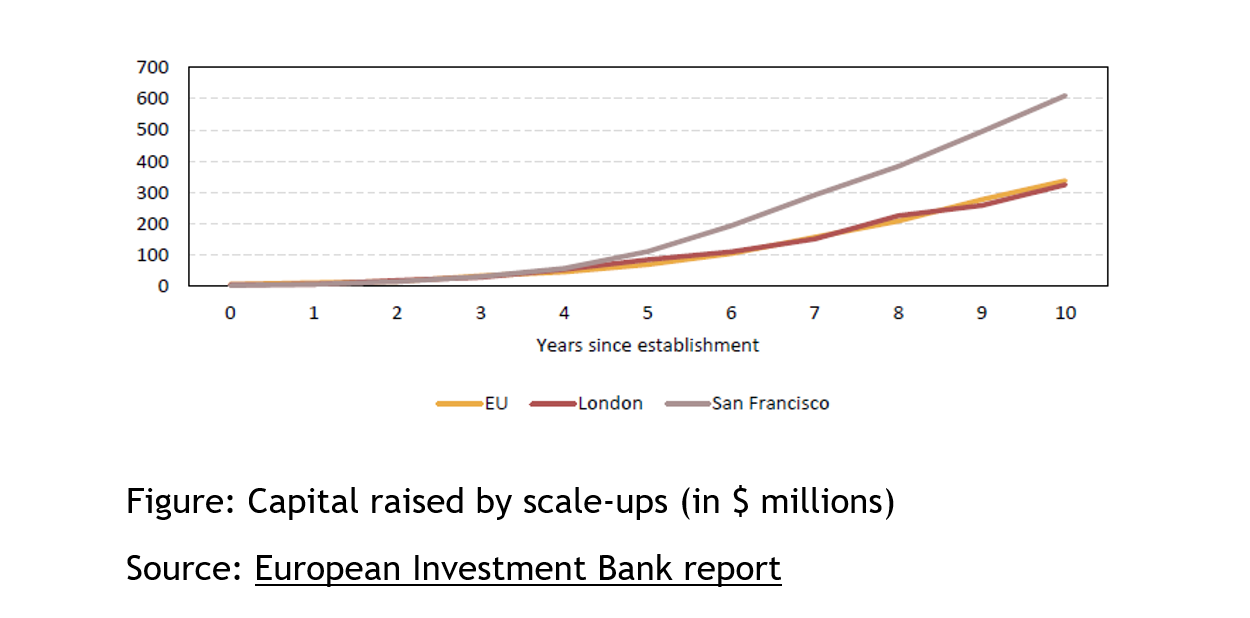While the US is producing global tech giants such as Google, Amazon, or Facebook, Europe is falling back, with only a handful of companies reaching similar scale. According to Atomico’s State of European Tech 2023, despite Europe’s strong startup ecosystem, only 1 in 10 European unicorns have achieved global success, compared to 1 in 3 in the US.
Interestingly, the EU has created more high-tech startups than the US, which raises the question: why is Europe still falling back? A study by the European Investment Bank highlights the barriers preventing European startups from scaling. Building on this, experts from Zubr Capital have further explored the challenges faced by late-stage and tech startups, offering insights on how to overcome these obstacles and drive Europe into the next era of innovation.
What is a scale-up and why is it important for startups?
A scaleup is an entrepreneurial venture that has achieved product-market fit and is now focused on achieving exponential growth through a mass market release and an intensified growth strategy. Only about 0.4% of all startups scale, reaching more than $10m in revenues within five years.
Many organisations concentrate solely on revenue growth without considering cost management, which can lead to failure. Wework and SoundCloud are two notable examples of companies that pursued this strategy and faltered. In contrast, King Digital Entertainment, the company behind Candy Crush, saw a 12-fold increase in revenue with only a sixfold increase in costs, demonstrating effective scaling. According to Harvard Business Review, for a scale-up to be successful, companies need to enter the extrapolation stage. It entails pursuing profitable growth while leveraging economies of scale. To achieve a successful scale-up, companies must be agile, maintain small teams, allocate human capital to the highest potential opportunities, and focus on sustainable growth.
Scale-ups are crucial for startups because they unlock numerous advantages, some of which are as follows:
Entering the big leagues
Once a startup achieves product-market fit, it can begin its journey to becoming a market or industry leader. Successful scale-ups not only generate significant revenue but also demonstrate high growth potential and a loyal customer base. This success leads to greater recognition in the venture capital landscape, resulting in premium valuations and easier access to funding.

US Tariffs are shifting - will you react or anticipate?
Don’t let policy changes catch you off guard. Stay proactive with real-time data and expert analysis.
By GlobalDataAccess to top talent
Scaling brings increased financial resources and enhanced industry reputation. This allows companies to attract top-tier talent by offering competitive compensation packages. Additionally, employees are more likely to join organisations that have a strong brand presence and proven success.
Exploring new opportunities
As scale-ups generate consistent revenue and growth in their core business, they gain the flexibility to explore new avenues. With more financial backing and a track record of success, these companies can invest in new areas and take calculated risks. Investors are often more supportive, as the firm has already proven itself in its primary market.
The existing venture capital and startup scenario in Europe
Venture capital plays a crucial role in funding innovative companies and fostering the creation of tech giants. Many industry leaders, including Apple, Facebook, Google, Spotify, Airbnb, and Uber, relied on venture capital in their early stages to fuel their growth. According to Mollica and Zingales (2007), a $64m increase in venture capital investment can lead to a 4-15% rise in patents and a 2.5% increase in new businesses. Venture-backed companies are typically highly innovative with significant growth potential, making venture capital essential for their expansion and success.
The venture capital and startup landscape in Europe has faced significant challenges in 2023. Atomico’s 2023 report projects a 45% decline in venture capital investment in the tech sector, with total funding expected to reach $45bn. This marks a sharp drop from $82bn in 2022 and $100bn in 2021. Notably, there have been virtually no major IPOs in Europe this year, and mergers and acquisitions (M&A) activity remains subdued. The reported deal transaction value in 2023 stands at $36bn, with most exits taking place at lower valuations, typically under $100m.
The scale-up gap: Why is it more relevant for Europe?
European tech start-ups are struggling to scale compared to their US counterparts due to a variety of factors. These include limited access to capital, fewer venture capital funds investing in European companies (both domestically and globally), and a preference among investors for safer assets such as banks and government bonds. Additionally, Europe’s relatively lower R&D spending further hampers the growth potential of start-ups, reducing their ability to innovate and compete on a global scale.
Here are some statistics that underscore Europe’s struggles with scaling up, and now is a crucial time to focus on these issues:
- The European Union has fewer than half the number of startups in the United States, and only one-fifth the number of scale-ups.
- By the time European scale-ups reach ten years of operation, they raise 50% less capital compared to their counterparts in San Francisco.
- In the European Union, more than 80% of scale-up deals involve a foreign lead or sole investor, compared to only 14% in San Francisco.
- 66% of the venture capital fund managers interviewed said there were insufficient financing opportunities for companies to scale up in Europe
- Venture capital investment in the EU has been only 0.03% of its annual gross domestic product (GDP), compared with about 0.19% in the United States
- Ten years after its establishment, EU scale-ups have raised, on average, 50% less capital than their US counterparts.

Tackling the scale-up gap: strategies to drive Europe in an era of innovation
While the challenge of building successful tech scale-ups and global giants in Europe may seem daunting, heavy investment in innovation is the path forward. Europe can learn from the success of venture capital and technology scale-ups in the United States and implement the following strategies to revive its tech ecosystem and usher in an era of innovation:
Active Participation of Pension Funds
The United States transformed Silicon Valley after enacting ERISA in 1974, which recognised that a “prudent person” would include a mix of riskier instruments in their portfolio. This shift allowed pension funds to invest in venture capital, fueling the growth of Silicon Valley. Without this reform, the tech hub might not exist today. In contrast, Europe is still operating with a pre-ERISA mindset. In 2022, European venture capital invested only 0.024% of EU pension fund assets. To unlock similar innovation, European governments must consider relaxing investment regulations, giving citizens the option to invest in riskier assets with informed consent.
Bolstering innovation hubs and incubators
The European government needs to bolster innovation hubs and incubators, as these firms act as intermediaries between startups and investors, supporting companies in their early stages of development. The European Union has seen some success in this area, particularly when incubators establish strong connections with the innovation activities of universities and research centers (such as PoliHub or KU Leuven Kick). However, these initiatives remain small and too fragmented.
Cross border integration
Currently, the 27 countries in the EU face fragmented venture capital funding, with each country having its own financial norms, tax regulations, corporate governance rules, and stock exchanges. This creates regulatory, legal, and linguistic differences across countries. The European Investment Fund is already prioritising cross-border venture capital firms. To further support startups, the EU should focus on reducing these barriers, enabling easier access to capital throughout the region, and facilitating successful scaling of startups.
Conclusion
The outlook for scaling up in Europe appears challenging, and it may be some time before a global tech giant emerges from the region. Europe can benefit by studying the success of Silicon Valley in the US and implementing similar strategies to address the funding gap. Governments should consider becoming active investors in startups, providing both capital and support to help these companies grow. Innovation should be at the heart of government initiatives and tech startups. The success of US-based startups in scaling up and dominating the global market is a key factor behind the US becoming the world’s leading economy.

Nikolay Shestak is a partner at Zubr Capital









